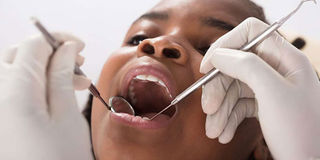Let’s create awareness on oral health issues

A routine dental check-up. Dental clinics are a critical step in increasing access to oral healthcare. PHOTO | FILE | NATION MEDIA GROUP
What you need to know:
- Kenya has one dentist for every 42,000 patients — meaning they treat six times more patients than the WHO-recommended 1:7,000 ratio.
- Smart tactics, such as working with community health workers, are needed to improve access to preventive and general care.
Oral health has gained prominence at the national government level and on the global stage.
A pointer to this is President Uhuru Kenyatta’s directive to the Ministry of Health last year to construct four eye and dental clinics — in Eldoret, Nyeri, Nairobi and Mombasa counties.
But while the dental clinics are a critical step in increasing access to oral healthcare, more needs to be done to give Kenyans deserved services. And oral health indicators are not where they ought to be.
According to the National Oral Health Survey (NOHS) 2015, the prevalence of tooth decay is at 34.3 percent among adults and 46.3 percent for children, while the World Health Organisation (WHO) cites tooth decay and cavities as the most widespread chronic disease.
PREVENTIVE CARE
A pertinent concern among dentists is that most Kenyans only visit them when the pain and discomfort becomes unbearable.
This poor oral health seeking behaviour not only increases the complexity and cost of treatment, but also leads to a disproportionate focus on curative measures at the expense of preventive ones, hence the huge gap in preventive care with many people, for example, not knowing how to use a toothbrush properly despite brushing their teeth daily.
Other underlying factors contributing to the high oral health disease burden include insufficient government funding and inadequate baseline data to guide planning and implementation of services.
While formulating an effective policy framework to address these issues, stakeholders need to urgently increase public awareness about oral health.
SCREENING
Among the many misconceptions about oral health is that a huge section of the general public does not view it as an integral part of general health and well-being despite the fact that oral diseases can affect the ability to breathe, eat, swallow, speak or even smile.
While Wednesday’s World Oral Health Day provided an opportunity for stakeholders to raise awareness about the importance of oral health, a more strategic and sustainable approach for engaging the public is needed.
A programme by Kenya Dental Association (KDA) and partners to increase awareness about oral health by providing free screening and treatment to schoolchildren, inaugurated last year, has reached more than 10,000 children in Nairobi, Murang’a and Nakuru counties.
Phase two, which kicked off recently in Kajiado County, will reach 10,000 more schoolchildren across Kajiado, Machakos and Meru this year.
EXPERTS
The key highlight of this corporate social investment isn’t free screening and treatment, but creation of 20,000 young oral health ambassadors who will grow up championing this important issue. This will have a more sustainable impact on awareness about oral health.
A major challenge worth mentioning is shortage of dentists. Kenya has one dentist for every 42,000 patients — meaning they treat six times more patients than the WHO-recommended 1:7,000 ratio.
Smart tactics, such as working with community health workers, are needed to improve access to preventive and general care, especially in rural settings where the shortage of dentists is particularly acute.
Ms Mwangi is the corporate affairs director, Developing Middle East and Africa, at Mars Wrigley Confectionery. [email protected]





